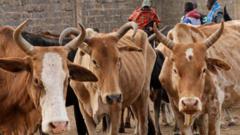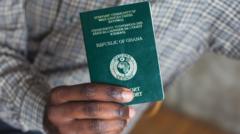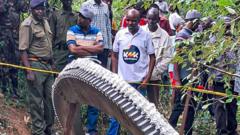An escalating controversy surrounds Kenya's livestock vaccination initiative, which aims to vaccinate millions of animals amidst widespread skepticism and mistrust among farmers.
Backlash Erupts in Kenya Over Livestock Vaccination Initiative

Backlash Erupts in Kenya Over Livestock Vaccination Initiative
Farmers resist government vaccination plan fueled by conspiracy theories and misinformation.
An ambitious vaccination initiative targeting livestock in Kenya is set to launch this week; however, it faces significant backlash from farmers stirred by misinformation. The government has pledged to cover the costs, but misconceptions about the vaccines have intensified tensions.
Robert Nkukuu, a cattle farmer from Nakuru County, voiced the risky stance that has emerged since President William Ruto announced the initiative last November, highlighting a culture of fear around pro-vaccination sentiments in his community. The government aims to vaccinate at least 22 million cattle and 50 million goats within three years to raise the vaccination rate from the current 10% to 85%, a necessary move to enhance export eligibility for Kenya's livestock products.
President Ruto asserted the vaccines' importance in tackling diseases like foot-and-mouth and peste des petits ruminants—conditions threatening agricultural productivity. Nonetheless, various unfounded conspiracy theories are leading many to distrust the initiative. Rumors have circulated about the involvement of prominent figures, particularly Bill Gates, resulting in a refusal to accept government intervention in livestock management.
Despite government reassurances that Gates holds no financial interest in the program, the misinformation persists, significantly driven by social media and public figures. Influential personalities, including farmer Caleb Karuga, have expressed their disdain for the initiative, contributing to a climate of disdain within the agricultural community. They cite fears of foreign manipulation and dubious motivations behind the campaign.
Academic experts, including Prof. Ermias Kebreab from the University of California, emphasize that no vaccine exists to modify methane emissions in livestock and denounce suggestions that vaccines alter animals' genetics. However, the spread of these claims showcases the poor communication strategies employed by the government, leaving room for mistrust to grow.
Opposition sentiments echoed by leaders like Kalonzo Musyoka present the initiative as an infringement upon farmers' rights and as “shrouded in secrecy,” calling for transparent communication from the government. Compounding the government's challenges is the deep-seated distrust fueled by prior administrative scandals and unpopular tax increases introduced since Ruto took office.
As analysts note a fundamental lack of trust, the Kenya Veterinary Association has called for a pause on the vaccination program, advocating for a robust public awareness campaign to clarify its objectives. Nevertheless, the agriculture ministry is adamant that immediate action is crucial, given recent outbreaks of diseases.
Agriculture Minister Mutahi Kagwe has pledged a voluntary vaccination process, promoting stakeholder engagement to counter misinformation, yet numerous farmers remain skeptical. For many, it's not merely about veterinary care—it's a question of safety and integrity within the local farming landscape. Transparent dialogue and community engagement appear to be vital to overcome the prevailing fears and misinformation, paving the way for healthier livestock and an ultimately more prosperous agricultural sector in Kenya.



















